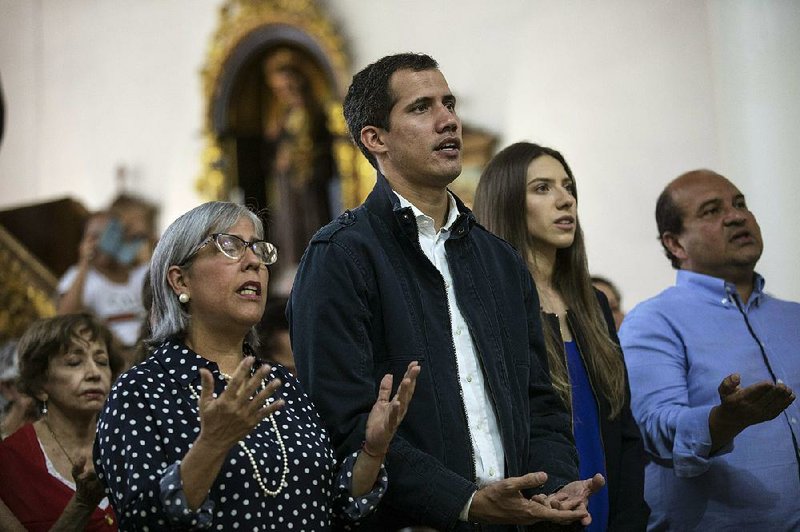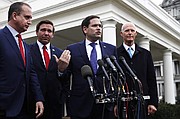Sen. Marco Rubio disputed Sunday that the United States would participate in a coup to oust Venezuelan President Nicolas Maduro, saying he doesn't know of any U.S. leaders who are calling for one.
The remarks came four days after President Donald Trump's administration recognized Venezuelan National Assembly leader Juan Guaido as interim president after Guaido and his supporters asserted that the 2018 election that kept Maduro in power was illegitimate. Many U.S. allies have followed suit, including Canada.
In Venezuela on Sunday, Guaido's supporters handed leaflets to soldiers detailing a proposed amnesty law that would protect them for helping overthrow Maduro.
At the same time, Maduro demonstrated his might, wearing tan fatigues at military exercises. Flanked by his top brass, Maduro watched heavy artillery fired into a hillside and boarded an amphibious tank.
Addressing soldiers in an appearance on state TV, Maduro asked whether they were plotting with the "imperialist" United States, which he accused of openly leading a coup against him.
"No, my commander in chief," they shouted in unison. Maduro responded: "We're ready to defend our homeland -- under any circumstance."
The history of U.S. military involvement in Latin America, along with reports that the administration met last year with Venezuelan officers who wanted to plot a coup before rebuffing them, has raised questions about whether the White House would direct a military intervention again. Trump has said that "all options" are on the table, while defense officials have sought to tamp down speculation that the Pentagon could become involved.
Rubio, speaking on CNN's State of the Union, said the United States is "simply supporting the democratic institutions" in Venezuela, along with many other countries in the Western Hemisphere.
"This is not the U.S.," he said. "This is Honduras. This is Guatemala. This is Canada, Brazil, Colombia, Argentina, et cetera, et cetera. This is not a U.S.-sponsored anything. This is the U.S. supporting the people of Venezuela, who want their constitution and democracy followed. That's a fact."
Rubio also has said that all U.S. options should be on the table, but he qualified that Sunday.
"The United States always retains the right -- always, anywhere in the world in any instance -- to protect its national security," he said. "So I'm not going to justify military intervention because I don't know who's calling for that. What I said is that everything is an option because we always have an option to defend our national security in cases where it is threatened."
Although the Trump administration's decisions on Venezuela last week received support from some Democrats, others have called for Washington to take a more limited role.
"The United States needs to stay out of Venezuela," Rep. Tulsi Gabbard, D-Hawaii, said in a tweet Thursday. "Let the Venezuelan people determine their future. We don't want other countries to choose our leaders -- so we have to stop trying to choose theirs." Gabbard announced this month that she will run for president in 2020.
Rep. Ilhan Omar, D-Minn., said in a string of tweets Friday that the United States should support the efforts of Mexico, Uruguay and the Vatican to facilitate peaceful dialogue in Venezuela and that a "U.S. backed coup in Venezuela is not a solution to the dire issues they face."
Rubio, in a separate interview on NBC's Meet the Press on Sunday, said Trump has "never needed any convincing on Venezuela" and has raised the issue for discussion with the senator more than the other way around.
The preferred outcome, Rubio said, is that Maduro leaves office and that within 30 to 45 days, Venezuela holds a new presidential election.
Maduro has cut ties with the U.S. and, at first, ordered its diplomats from Caracas within 72 hours. The U.S. defied him, saying Maduro isn't the legitimate president, and Maduro relented, suspending the deadline for 30 days for the sake of opening a dialogue.
Venezuela's armed forces remain the key to Maduro's hold on power, firing tear gas and bullets on protesters, killing more than two dozen since Wednesday.
Emerging from Sunday Mass, where he honored those killed and arrested in the recent protests, Guaido called on the armed forces not to shoot fellow Venezuelans.
"We are waiting for you and the commitment you have to our constitution," Guaido said. "Don't shoot at those who have come out to defend your family, your work and livelihood."
Guaido's supporters made their case directly to soldiers on Sunday, handing them the leaflets urging them to reject the socialist leader and explaining how they could be eligible for amnesty if they help return Venezuela to democracy.
In Paraiso, an area of Caracas where residents and the National Guard violently clashed, opposition lawmaker Ivlev Silva, his hands raised over his head, walked up to a line of soldiers wearing riot gear and holding shields.
"The people of Venezuela believe in each one of you," Silva said, handing them the leaflets. Their commander responded that they were defending the Bolivarian revolution and support Maduro.
Also Sunday, Guaido said in an interview that the Venezuelan opposition is in talks with sympathetic military and civilian officials in a bid to force out Maduro. Backed by the United States and other countries, Guaido said, the opposition will test the socialist government by obtaining food aid to ease a crippling humanitarian crisis. That aid is made possible by a $20 million pledge from the United States, as well as offers from Colombia, Brazil, Argentina, Paraguay and the European Union.
"We have been in talks with government officials, civilian and military men," Guaido said. "This is a very delicate subject involving personal security. We are meeting with them but discreetly."
Guaido also said that ahead of his proclamation as president, he had met or spoken with several U.S. senators, including Rubio, Dick Durbin, D-Ill., and Robert Menendez, D-N.J.
Information for this article was contributed by Dan Lamothe, Andreina Aponte, Anthony Faiola and Rachelle Krygier of The Washington Post; and by Scott Smith and Fabiola Sanchez of The Associated Press.
A Section on 01/28/2019

